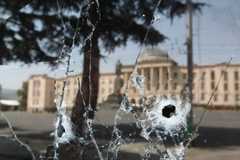Georgia/Russia conflict / Global
War on truth
During the conflict in South Ossetia, western media were given free access by the Georgian government, while on the Russian side, foreign journalists were being either arrested or herded around by the military. In both cases, however, the true picture of what was happening was hard to come by. Monocle’s correspondents reported from both sides, and have revealed the maze of misinformation and media management.
Media war 01:
View from Georgia
“How do I say it? Tishvili? Shintali? Kin- shali?” a leading international journalist, about to film live from tbilisi, quizzed colleagues over how to pronounce Tskhinvali, the South ossetian capital which in early august turned from a sleepy, provincial outpost to the centre of the world’s biggest news story (for a close approximation try “tskin varly”). Every major media organisation had to deal with news from places their journalists – let alone viewers and readers – had never heard of.
For over a week, the world’s media shuttled between tbilisi, Georgia’s capital, and Gori. Initially the scene was of a huge mobilisation of Georgia’s uS-trained army as it poured forth to conquer the breakaway enclave of South ossetia; Gori then witnessed the same army’s panicked retreat – followed by russian occupation. Most broadcast networks sent in one or two of their top international correspondents, as well as reporters with knowledge of the region. At the conflict’s peak the BBC had six correspondents and 20 back-up staff camped out at the Tbilisi Sheraton, while Al Jazeera English, the first English-language network on the scene, had five correspondents and similar back-up. Its Moscow correspondent, Jonah Hull, says, “we were filming ‘lives’ from the hills above Tskhinvali on the first night, as the Georgians were bombarding the city with missiles.” Meanwhile, the BBC’s Tbilisi correspondent and staff were paralysed, waiting for their Moscow bureau chief to arrive.
The best-equipped newspaper in Tbilisi was The New York Times, with six correspondents. The British broadsheets all had their Moscow correspondents in tbilisi, and many also brought in a “fireman” from London to assist operations. Earliest on the scene was Adrian Blomfield, of the Daily Telegraph, who managed to get the last flight from Moscow to Tbilisi and was in Gori by the afternoon of Friday 8 august. Last to arrive was The Guardian’s Luke Harding, who was belatedly called back from holiday. Most British tabloids also sent people as the conflict escalated, and while I was there I met journalists from Ukrainian, French, German, Italian, Swedish and eastern European outfits.
There were two different types of reporter covering the short war. There were those who knew the region well – a small clique in Tbilisi as well as Moscow correspondents past and present – many of whom had not covered a war. Then there were the war hacks, running into each other in Gori for the first time since Kabul or Baghdad, who had little regional knowledge but were keen to get in on the action.
This manifested itself in Gori during one of the false alarms that the Russian army was about to storm the city. Terrified journalists pelted down the stairs of the makeshift press centre, yelling “Get out! the Russians are coming!” They rounded up their drivers and made a dash for it, led by the wire agencies and the BBC.
“Well, if the Russians are coming, we need to stay,” said a confused Kim Sengupta, defence and diplomatic correspondent of The Independent. His colleagues, including this Monocle correspondent, persuaded him to pile into the last available car to beat a retreat to Tbilisi.
The region’s novelty was apparent as sub-editors across the globe botched the lengthy, consonant-heavy Georgian surnames and town names. CNN even showed pictures of a devastated Tskhinvali and said it was Russian-damaged Gori – presumably an innocent mistake, but one that incensed the Russian foreign ministry.
There were a few Russian correspondents, but mostly in Tbilisi. The Georgian government blocked Russian websites, creating numerous headaches. The major Russian television stations had, at most, one correspondent in Tbilisi, whose job was to churn out a Kremlin-friendly version of events. Russian-based correspondents in Gori were escorted in by the Russian army. The Tbilisi correspondent of Russia Today, William Dunbar, resigned at the beginning of the conflict, because he was “unable to do his job properly”.
Georgian president Mikhail Saakashvili’s government is packed with young, western-educated ministers who were often called on their mobiles for quotes. This undoubtedly scored the Georgians an advantage over the more cumbersome Russian media machine.
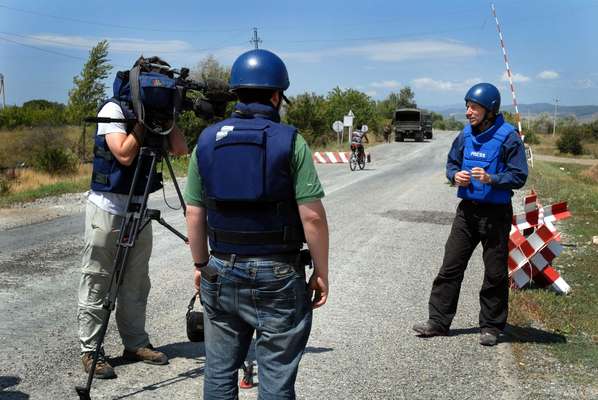
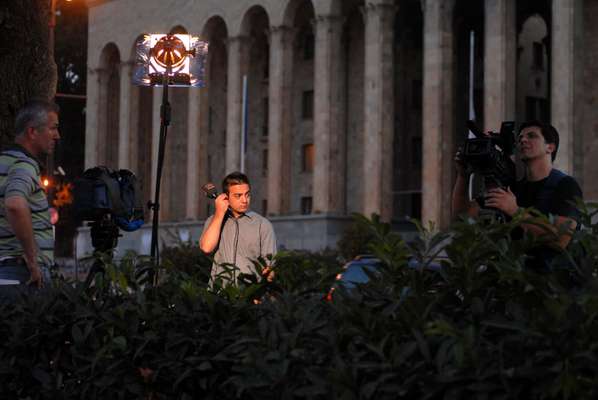
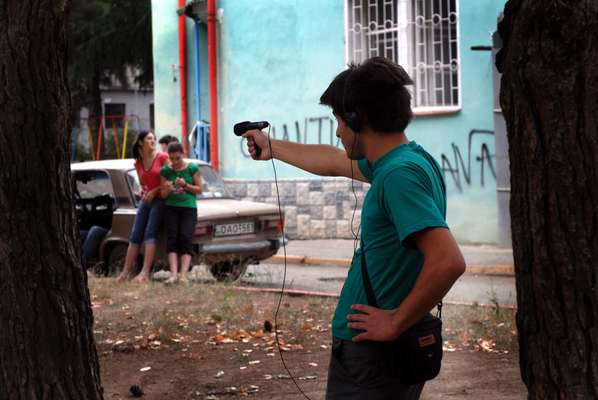
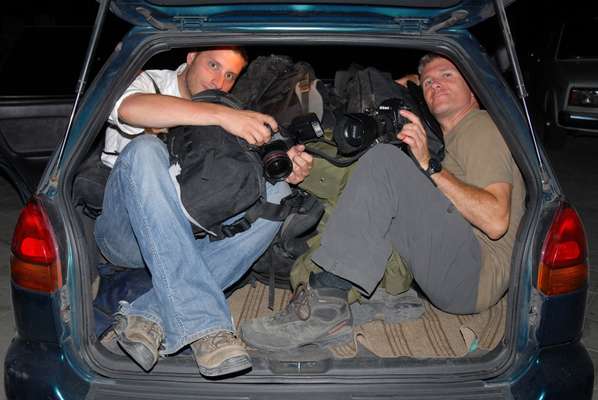
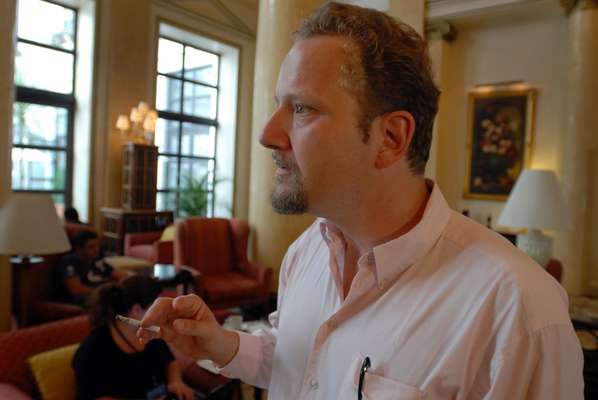
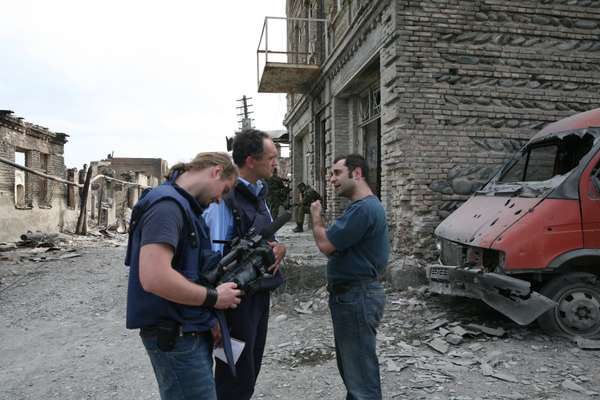
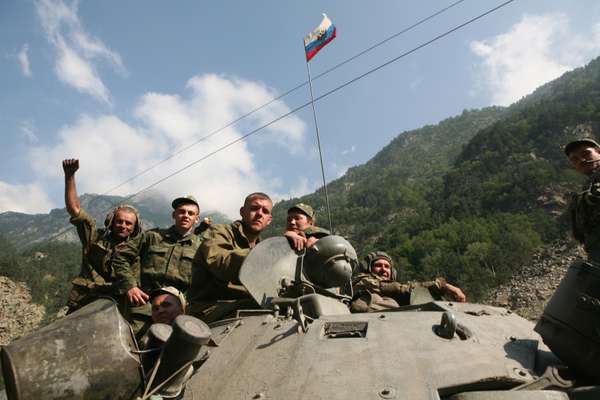
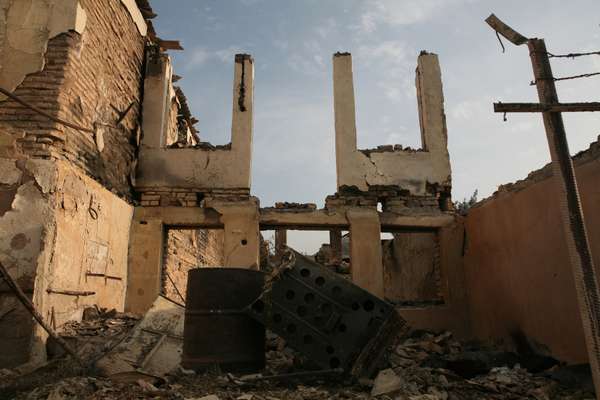
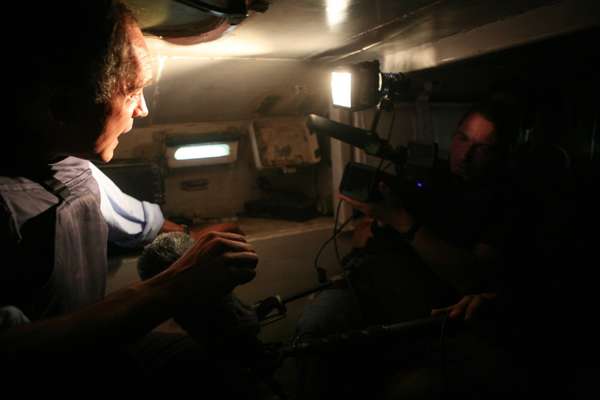
“My best PR team is in the Kremlin,” jokes Patrick Worms, a consultant for Aspect, the Brussels-based company that manages the Georgian government’s interaction with the western media. Worms, an affable German who could usually be found in various stages of sleep deprivation at his laptop in the Tbilisi Marriott, says that on busy days his 20-strong staff in Brussels, Paris and London had to abandon clients to work on Georgia. He was “happy” with American and British press coverage, but found France and Germany too sympathetic to Russia.
“I learned more about how much the media distorts during this crisis than I did in 15 years working in PR,” says Worms. Georgian officials kept Skype open, where information would be emailed to the western media by Worms’s team.
But there was a suspicion that false information was being released by the Georgian side. The Russians’ final occupation of the key strategic city of Gori hardly made the news, as the Georgians had twice announced its occupation already. Another incident that smacked of a dirty trick was when a telephone press conference to foreign news editors around the globe with Mikhail Saakashvili was interrupted halfway. A message was sent out explaining that Russian jets had flown over the presidential palace, and he had to escape to the bunker, prompting excited headlines. It was later quietly announced that the scare had in fact been a Georgian civilian plane overhead.
On 18 august, the date russian troops were due to withdraw from Georgia, media outlets headed for Gori. As journalists chatted with their editors on satellite phones near the last checkpoint in the village of Igoeti, the word spread that the Pakistani president Pervez Musharraf had resigned.
Georgia was a footnote in international news that day. A day after Sky had it pushed down to fourth billing in the evening news, behind a frog in England that “croaked with a northern accent”, it was clear that interest was waning.
The next day the Russians showed no sign of leaving, but media teams began their own slow withdrawal, leaving a small contingent of journalists behind to cover the ongoing, simmering tensions.
Media war 02:
View from Russia
The husks of Georgian homes line the road into Tskhinvali, victims of violence and looting in the aftermath of the Russian invasion. The stench of death permeates the air. Hundreds, perhaps thousands of modest buildings lie in ruins, their roofs collapsed and walls blackened with soot. But western journalists are not supposed to see that.we are stuffed back inside the russian armoured personnel carrier.
“It is for your own safety,” says the Kremlin minder assigned to the military embeds that provide our only access to South Ossetia. He opens a ventilation hatch, but we are not allowed to peer out. The only sight in the darkness is of the leg of a blonde Russian journalist, dangling from her seat on top of the vehicle.
“It’s hard to figure out what information is accurate, and whether you’re being played,” says a producer from a major western television channel. “It fosters a feeling that you’re being manipulated.”
For a western journalist, covering a war from russia is difficult. You cannot go anywhere alone. You cannot ask questions. You are constantly lied to. But you keep coming back for more. “It’s like dating a tease,” says one western reporter. “Every two days we’re like, ‘I’m not taking these fucking tours anymore,’ and then the next day we’re praying the Russian army will show us some tit so we can cop a feel.”
During the first Chechen war, before the days of Putin, journalists were allowed to roam freely. after the disastrous effect that had on the morale of a Russian population traumatised by the collapse of the Soviet Union, the Kremlin turned off the tap. No more than 10 major foreign television channels made it to this side of the war. When a western-friendly government offers full access just 200km south, why come to Russia, where you face detention, or worse, for doing your job?
CNN reporters were nearly arrested in Tskhinvali for broadcasting on the street and correspondents from The New York Times were threatened with deportation. Standing in the early morning light just outside Tskhinvali general hospital Pyotr Gasiyev, a producer for Russian channel NTV, listens politely as western journalists rant about not being allowed to investigate the charges of ethnic cleansing in South Ossetian villages. After a brief pause, he says that he too has a problem.
“We have four Jeeps [of Russian journalists] from all over Russia,” he laughs. “I don’t know what to do with everyone.”
At the heavily guarded border into South Ossetia, Russian television crews stream through large metal gates. Their ratio to foreigners could not have been less than four to one. Peering with contempt from behind the gated border post, an FSB (Federal Security Service) officer explains that foreigners are barred. “And can I look at your documents, please?”
Five hours later, in the local FSB headquarters over tea and biscuits, a forced confession and a promise never again to stop on a forbidden road, we ask our minder if our barred access had anything to do with the unannounced arrival hours before of Prime Minister Putin. “Perhaps you don’t understand our rich language,” says the officer. “This is a road where it is impossible for you to stop. Impossible!”
This was the first time I was arrested. All in all, I was detained three times and threatened, good-naturedly, with execution if I didn’t get in my armoured vehicle.
Despite exhortations to the contrary, the Russians realised from the beginning that they had an advantage in this media war. Giving national press total access while restricting western journalists is a win-win situation for the Kremlin.
“It’s a question of mentality,” says one official, after yet another question about the villages. “There are some who think that you’ll write shit or you’ll write shit, so why bother letting you in at all?”
An on-call doctor greets us in Tskhinvali’s hospital, its floors strewn with bloody surgical gloves and used scalpels. “Dear journalists,” she says, “thank you for coming. I only wish you had come here sooner so that you could have seen what happened here with your own eyes.”
Surprisingly, most russian journalists agree with the treatment of the foreign press. We are all hypocrites, says Nadia Azizova, a presenter for Kremlin-backed Russia Today, lounging on a blanket next to her satellite dish.
“Whenever you’re covering a war you’re either on one side or the other,” she says. “There’s no way to be impartial.”
Does she consider us colleagues?
“Yes. But I don’t think that we have the same profession.”
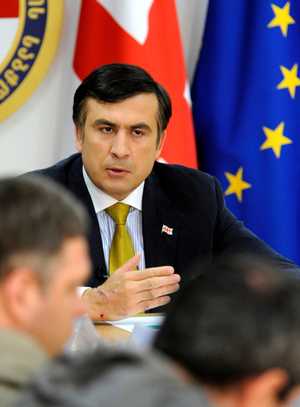
Top Georgian PR moments
€01 -Flagged up
Saakashvili’s press conference with EU flags The EU flag flies alongside Georgia’s in the country. The president wants the nation to be transformed into a modern European state, and also to prove that it is a democratic state whose fate has implications for Europe.
02- Grounded
Saakashvili on the floor as Russian jets fly overhead This was meant to show that the Russians were barbaric enough to bomb even as the French foreign minister, Bernard Kouchner, was visiting Gori. But it backfired, as the Georgian president appeared weak as he cowered under his guards, especially as his population was later abandoned by their army.
03 Time to party
Rallies with Georgian flags
These Tbilisi rallies played well at the time, but may come back to haunt Saakashvili. There was definite outrage against the Russian aggression that drew Georgians around their leader, but many questioned the tenure of the rallies. Just a day after the Georgian army had fled in disarray, Saakashvili appeared to be holding a victory party.
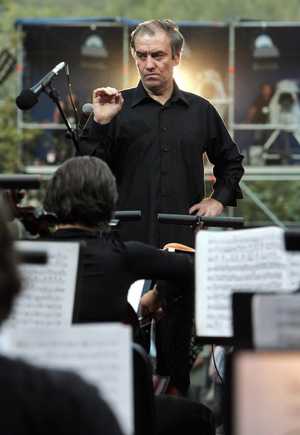
Top Russian PR moments
01- Hollow sounds
Gergiev conducts Kirov
Moscow flies Valery Gergiev, the London Symphony Orchestra’s principal conductor and an ethnic Ossetian, into Tskhinvali where he conducts the Kirov in Shostakovich’s 7th Symphony, composed during the Leningrad siege.
02 Fire starters
Burning of ethnic villages
Even after western journalists had seen the destruction in Georgian villages in South Ossetia such as Tamarasheni, Kurta, and Kekhvi, the Russians continued to refuse them access, making it look like they had something to hide. Excuses for the fires ranged from power surges to Georgian commandos burning their own villages.
03- Image problem
Medvedev and Putin visit Vladikavkaz
Prime Minister Vladimir Putin arrived in Vladikavkaz like a true commander in chief two days into the conflict. Ten days later, Medvedev flew in under a media blackout, refusing coverage of him handing out medals to veterans. This only succeeded in making him look like more of a lame duck than he does already.

